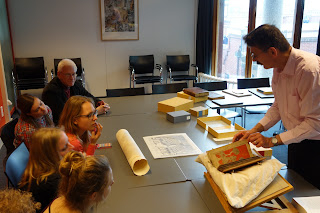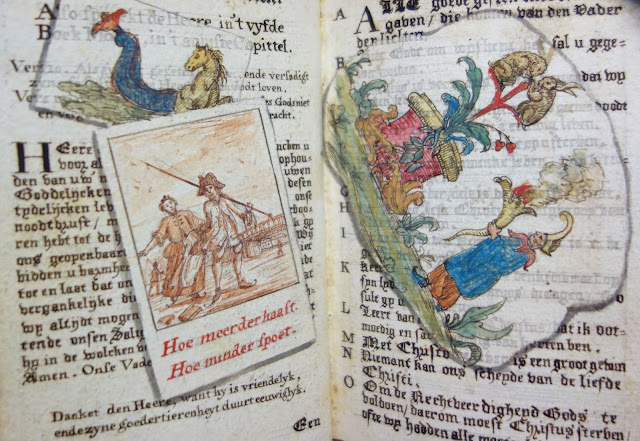How it all started: on serendipity
 If ever there was a case of serendipity, it must be the discovery of the first trompe l'oeil booklet.
If ever there was a case of serendipity, it must be the discovery of the first trompe l'oeil booklet. On 2 May 2014, my dear colleague and medievalist Roel Zemel (Vrije Universiteit Amsterdam) asked me to join him on an excursion to the Special Collections of Leiden University Libraries, where chief curator André Bouwman would show our students some highlights of the Leiden collection of medieval manuscripts.
A few days prior to the excursion, I was asked to put in a wish list of early modern manuscripts I would like to see. Because I was working on an alphabet poem at the time, I was intrigued by the catalogue's description of an illustrated alphabet book in manuscript from the eighteenth century. Surely it would be something along the lines of 'A is for apple', but one never knows.
The students were treated to treasures such as the Roman van Walewein, Ferguut, prayer books and parchment.



Then it was my turn: the ABC book would be shown. A tiny booklet appeared, causing a huge surprise:
Not only did it not look one bit like a manuscript, the illustrations were also far from what I expected. And when even a curator is momentarily lost for words, you know for certain you have stumbled upon something special.
If it hadn't been for Roel Zemel and André Bouwman, chances are that I would never have set eyes on this book. Or would I? It turns out that there are books about serendipity in (archival) research!
In her article 'Fortuitous Happenstance. Serendipity in Archival Research' in Serendipity in Rhetoric, Writing, and Literacy Research
(ed. by Maureen Daly Goggin and Peter N. Goggin, Utah State University Press 2018), Lynèe Lewis Gaillet refers to an earlier book, Practical Research Methods For Rhetoric and Composition (ed. Alexis Ramsey and others, Southern Illinois University Press 2010) in which Lori Ostergaard published the answers to four questions about serendipity, asked to seven archivists.
These were Ostergaard's questions:
1. Describe a time when you inadvertedly struck gold (great or small) in the archives, or tell us about a time when you were looking for one thing and discovered something else.
2. Fleming recognized the potential in his moldy Petri dish. How did you know when you inadvertedly struck gold in the archives?
3. Have you ever temporarily suspended work on one project to follow a serendipitous lead? If yes, when has this happened, and where did the lead take you?
4. Have you ever talked about serendipity when describing your own archival work? Have you ever told readers or listeners about your chance discoveries in the archives? If yes, which projects did you discuss, and how did you describe your good fortune?
I have given a few answers in this post already. How about you?





I enjoy learning about unexpected finds during research.
ReplyDelete